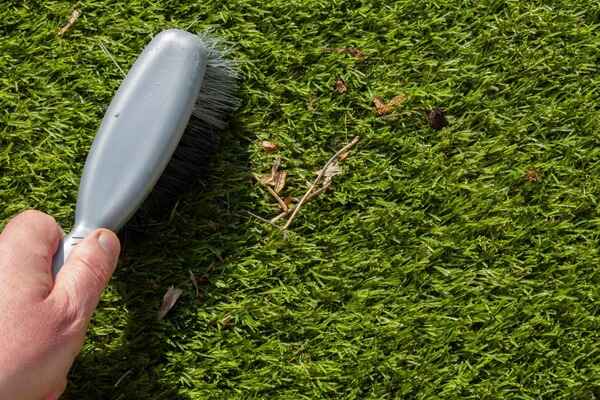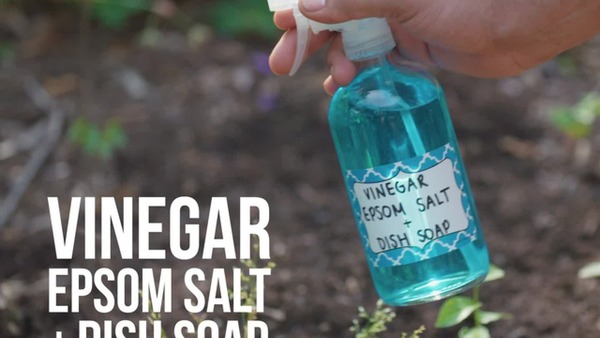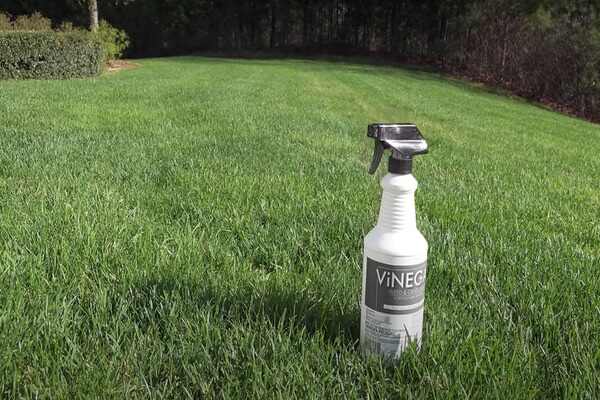Vinegar has a lot of uses. One of the uses of vinegar is to kill weeds in the garden and lawn. However, before using vinegar to kill grass, you need to know some things because it will kill any plant it comes into contact with. In this article, we will talk about how vinegar kills grass, how to use vinegar to kill grass, and its potential pros and cons.
How does Vinegar Kill Grass?
Vinegar can help you get rid of unwanted weeds or grass growing in your sidewalks or your driveway. This is because of the acetic acid in vinegar which causes plants to dehydrate quickly. The acetic acid in the vinegar dissolves the cell membranes which takes the moisture out of the plant cells completely making it dehydrated.
To live, plants need to be hydrated and since the vinegar takes it away, after a short while, they die
Perennial weeds with deep roots must be treated with vinegar multiple times to get rid of but younger weeds will die completely within some time.
How to use vinegar to kill grass?
Since vinegar can kill any plant or grass that it comes in contact with, you need to be careful with it. If you want to use vinegar to kill the weeds in your yard, you should apply the cleaner directly onto the weeds. You could try applying the vinegar with a paintbrush instead of filling a spray bottle with vinegar and spraying it all over your lawn.
The reason this is a good idea is because with the brush, you could use the vinegar only in the weed you’re trying to clean without harming the other grass near it. Spraying will kill everything and you don’t want to do that unless your goal is to kill everything. Also, make sure you do it on a sunny day with no rain or wind. While rain could just wash away the vinegar, wind could spread the herbicide to other parts of your lawn. Make sure you reapply the vinegar if it rains shortly after you applied it.

If you accidentally spill vinegar in other parts of your lawn which you don’t want to kill, make sure you rinse the area thoroughly with water to protect them.
It can also help to get rid of fungus or insects that are harming your grass. A way to increase its potency would be to add salt and dish soap with the vinegar. However, this should only be done in the leaves and not the soil as it could deplete the soil’s nutrients.
You may also be interested in: How Can I Get Rid Of Ants In My Microwave?
Is it bad to use vinegar to kill grass in your lawn?
There are several reasons why using vinegar could be a bad idea for your lawn. It is a natural substance but that doesn’t mean it is completely safe to use on your lawn. In reality, it can actually be a bad idea and have some serious consequences, mainly as a beginner.
The obvious reason why vinegar is bad as a weed killer is because it could kill your lawn completely or even your garden plants if you’re not careful while using it and make a mistake. Wind could be a problem as it could transfer vinegar to other plants and kill them. Young plants can find vinegar to be fatal.

If the weeds are perennial, it could be hard to kill them with vinegar because regular white vinegar is made up of around 5% of acetic acid and it’s not enough for killing weeds with strong roots.
They will continue to regrow because the acidic acid won’t affect the roots.
There are stronger vinegars with larger concentrations of acetic acids and are more potent in killing plants. But, the problem is the USDA claims that if there is more than 11% acetic acid, it can damage your eyes and even burn your skin.
Pros of Using Vinegar to kill grass
-
Acts as a natural alternative to herbicides
-
It can kill immature broadleaf weeds within a day
-
It only requires household products
-
It is cheaper than commercial products
-
It is more convenient than lawn care companies
Cons of Using Vinegar to kill grass
- It must be reapplied constantly
- It is not effective against grassy weeds
- It only works for annual weeds
- It is not effective against more mature weeds
- It does not kill the roots of the weeds
- It can require use of harmful salt
- If not careful, it will kill your lawn and flowers
- It is harmful to beneficial insects
- It has an unpleasant odor
- It could potentially be harmful to humans
FAQs
1. Does vinegar kill grass?
Yes, Vinegar does kill grass and weed.
2. How does vinegar kill grass?
The acetic acid in the vinegar dehydrated the plant of any moisture, eventually killing it.
3. Is using vinegar to kill grass in my lawn a bad idea?
It depends on a lot of factors as proper use could potentially be effective and a cheap option but since it could pose threats to humans, it could be a bad idea.
4. What should I do if I accidentally spilled vinegar all over my lawn?
Since vinegar could kill your entire lawn if you spill it, make sure you wash it thoroughly with water immediately after spilling. This could wash the vinegar away and cause less damage.
You may also like to read: Thinking About Mixing Vinegar and Ammonia For Cleaning? Read This First!
